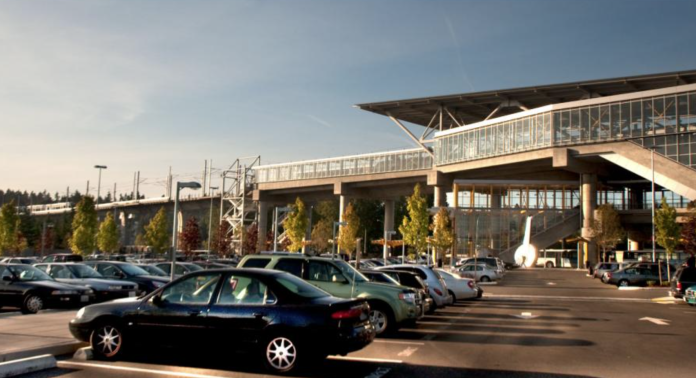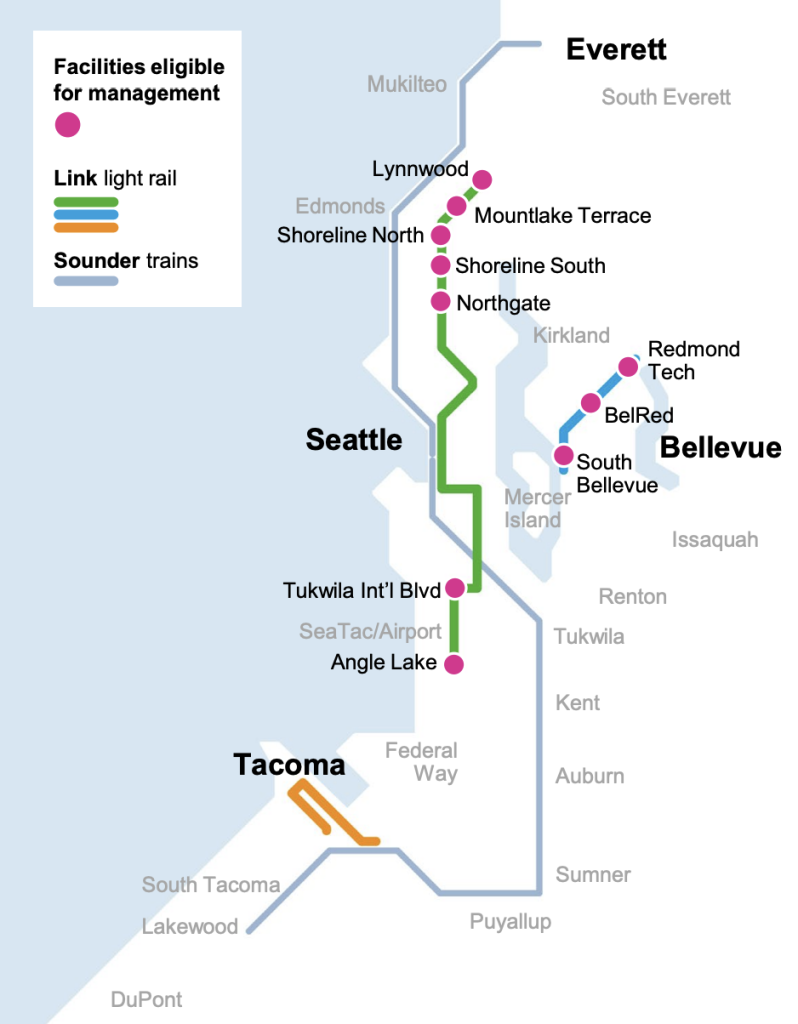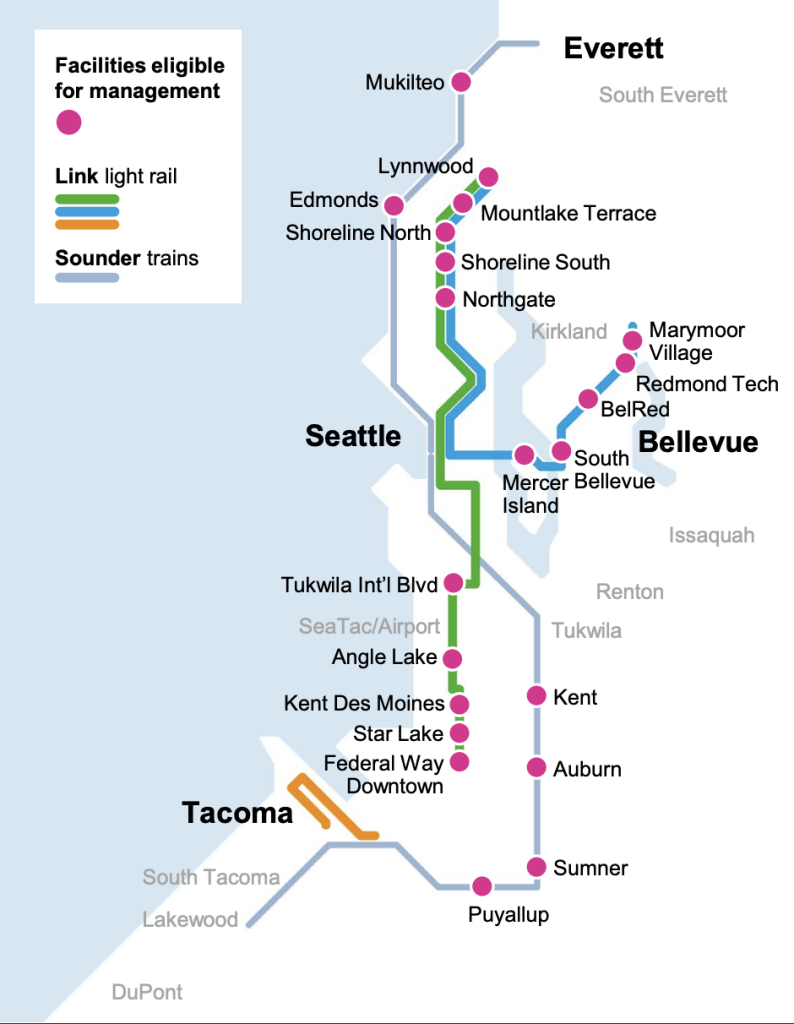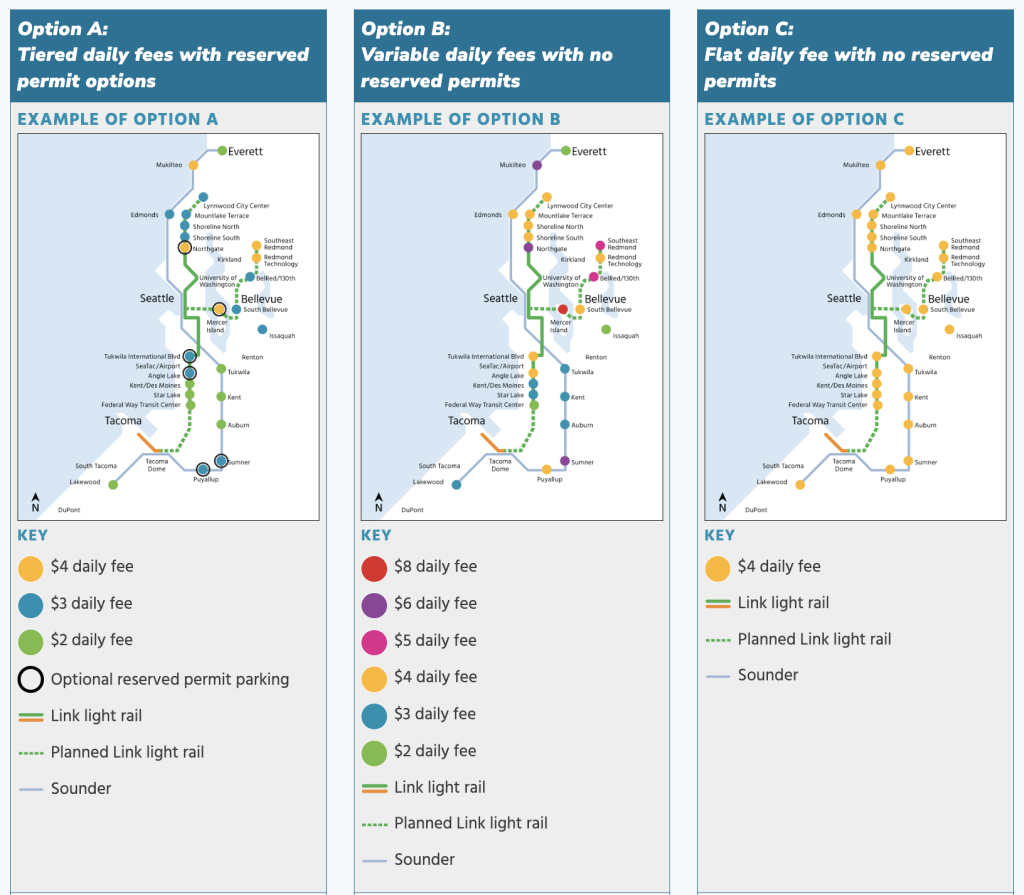
Sound Transit has unveiled details of its newly recommended parking management strategy. Daily paid parking would be rolled out to parking facilities owned and operated by the agency with initial implementation later this year. Sound Transit would also make some changes to its existing reserved permit parking program.
Staff-recommended parking management program changes
Using a performance-based parking approach, Sound Transit would introduce paid parking on weekdays except for Fridays. Initial regular daily parking fees would be $2 per day for riders parking before 2:00pm. Paid parking wouldn’t apply that or on other days — even when there might be significant special events (e.g., concerts or games in Seattle).

Not all agency parking facilities would see paid parking added. Staff are recommending that paid parking only apply to Sound Transit parking facilities at Link stations or where parking utilization consistently exceeds 70%, what the agency refers to as eligible facilities. The policy change, however, would allow the agency to designate up to 100% of parking stalls as paid parking at eligible facilities.
Sound Transit would focus initial implementation at all Link stations with parking facilities. That would mean rolling out paid parking at 10 locations along the 1 and 2 Lines, coinciding the opening of the Lynnwood Link Extension later this year.
By 2026, Sound Transit would greatly expand the program to a projected 21 facilities along Link and Sounder lines, an expansion based upon agency demand forecasts. Notable locations that wouldn’t be covered by the program are Tacoma Dome Station, which is owned and operated by Pierce Transit, and Everett Station.

The agency’s current parking management policies are fairly limited. Only monthly reserved parking permits can be issued at eligible parking facilities and no more than 50% of stalls can be managed. Agency policy defines those eligible parking facilities as either Link stations or facilities with more than 90% parking utilization. The reserved permit parking program is designed to offer permits to single-occupancy drivers for a fee (reduced for low-income riders) and carpool drivers for free.
However, systemwide parking utilization remains modest at around 48% as of this past October with facilities outside the Link light rail network seeing relatively low utilization rates. Consequently, Sound Transit has only reinstated monthly reserved permit parking at Northgate and Tukwila International Boulevard stations and only for carpool drivers at this time.
The staff recommendation would extend the reserved permit parking program, but slightly modify it to set the eligibility criteria only to facilities with parking utilization above 90% and allow up to 25% stalls to be classified as reserved. Another recommended policy change would allow reserved permit parking to be offered daily, which would require online reservation. The cost for reserved permit parking would be higher than the average daily cost with a monthly permit and regular daily parking fee.
“Because Link parking facilities would be eligible for both daily fees and reserved parking, we will test passenger interest in reserved parking options,” Alex Krieg, Sound Transit’s station access planner, told the agency’s Executive Committee on Thursday. In time though, rates and reserved permit parking could change.
“We would expect some variation in fee rates and reserved parking options as we would likely adjust those rates and options based on observed performance,” Krieg said. That would be an administrative decision, however, leaving it unclear at this time where more reserved permit parking would be located and what daily parking fee rates might be — though the tea leaves suggest as much as $4 per day at some locations.
Cost recovery through paid parking would be very low
Under the program staff are recommending, paid parking systemwide is projected to only raise $6 million to $7 million by 2026. In essence netting about $4 million to $6 million per year when discounting administration costs. Consequently, the recommended $2 daily parking rates significantly undervalue the cost of parking.
As an example, Sound Transit is currently spending about $360 million on just three new parking-oriented projects at Sounder stations in Kent, Auburn, and Sumner. The agency plans to construct around 1,500 parking stalls at these stations with costs inching toward $240,000 per parking stall. Amortized over 30 years, this will cost about $8,000 per year per driver, or about $30 per day. If and when parking fees are charged at these facilities, Sound Transit is likely to recoup less than 5% of the daily parking cost.
As another example, in 2019 when the agency had begun to implement monthly reserved parking permits for single-occupancy drivers, costs ranged from $45 to $120 per month. That program was suspended in 2020 as a result of the pandemic and has been on hiatus since, but it’s illustrative of how Sound Transit had valued parking, which on the low end was about $2.25 per day and on the higher end about $6 per day.
Peer agencies also tend to charge modestly higher daily parking fees. LA Metro and the Bay Area’s BART charge $3 daily flat rates with a few exceptions, D.C.’s Washington Metro charges $4.70 to $10 daily rates, and Boston’s MBTA charges $2 to $9 daily rates with most somewhere in between.
On top of this all, survey data from Sound Transit shows that park-and-ride transit users tend to be wealthier than riders at other transit facilities, making them less price sensitive. About 62% of park-and-ride users have incomes of $75,000 or more — with the bulk of those making over $100,000 — compared to other transit facilities where it’s closer to 50%. Low-income riders are particularly underrepresented at park-and-rides, making up just 13% of riders compared to 29% at other transit facilities.
Public feedback supports parking cost recovery

During the public engagement phase, Sound Transit tested three broad alternatives in a survey:
- A tiered parking fee system with $2, $3, and $4 daily rates as well as reserved permit parking;
- A variable parking fee system with daily rates ranging from $2 to $8 based on demand and no reserved permit parking; and
- A flat parking fee system with $4 daily rates and no reserved permit parking.
Overall public feedback didn’t land on a majority preference for any alternative, but the tiered parking fee system with reserved permit parking did command the support of 48% of respondents. A flat daily fee system with no reserved permit parking clocked in another 34% support and the variable parking fee system with no reserved permit parking came in last at just 18%.
Testing options with no reserved permit parking could have affected preferences, however, so divining too much from the results could be misplaced. That’s because the same data shows strong majorities believe that recovering costs to provide parking (65%) and generating revenue from parking (61%) is important — neither of which the recommended strategy will much achieve.
Nevertheless, a formal recommendation is expected to be made next month and could be finalized at the Sound Transit Board of Directors’ full board meeting at the end of March.
Stephen is a professional urban planner in Puget Sound with a passion for sustainable, livable, and diverse cities. He is especially interested in how policies, regulations, and programs can promote positive outcomes for communities. With stints in great cities like Bellingham and Cork, Stephen currently lives in Seattle. He primarily covers land use and transportation issues and has been with The Urbanist since 2014.

